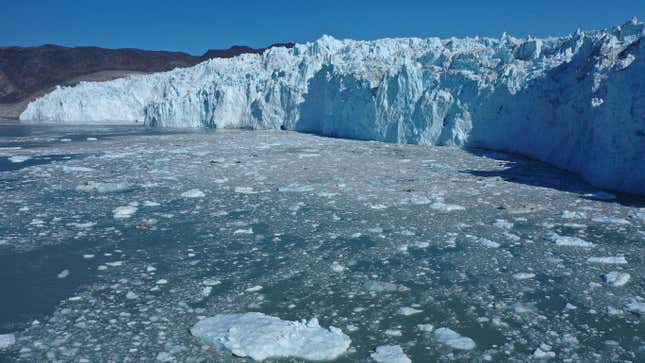
After Greenland spent a good portion of July on fire, last week’s heatwave similarly scorched the country’s ice sheet, triggering a meltdown affecting roughly 60 percent of its surface. On Thursday alone, new data shows the ice shelf lost 12.5 billion tons to surface melting, its largest single-day loss in recorded history, the Washington Post reported.
It’s not exactly the kind of record you’re happy to see broken. More like terrified. The last time Greenland had a meltdown this massive was in 2012, when its ice sheet sent more than 10 billion tons of runoff into the ocean, according to data from the Polar Portal.
Scientists came to this frankly alarming number based on computer model estimates referencing satellite and other data. Per the Washington Post, a senior researcher at the National Snow and Ice Data Center, Ted Scambos, explains the process below:
“This model, which uses weather data and observations to build a record of ice and snowfall, and net change in mass of the ice sheet, is remarkably accurate. I would accept the result as fact. 12.5 billion tons [lost] in one day, and the highest single-day total since 1950.”
That’s as far back as data about the ice sheet’s daily mass loss has been recorded. Satellite images included in Gizmodo’s coverage earlier this week show how widespread the melting had become with snowmelt clearly visible at the ice sheet’s edges. Video shared on Twitter also revealed that at one point melted runoff became so severe it transformed into sediment-laden rivers of rushing water. The Washington Post reports that in total the ice sheet lost 197 billion tons of runoff during July.
As the warm weather subsides in the coming months, parts of Greenland’s ice sheet will slowly begin to solidify once more, but we’ll be seeing the effects of that 12.5 billion tons of ice it lost to the ocean for much, much longer in mounting sea level rise.